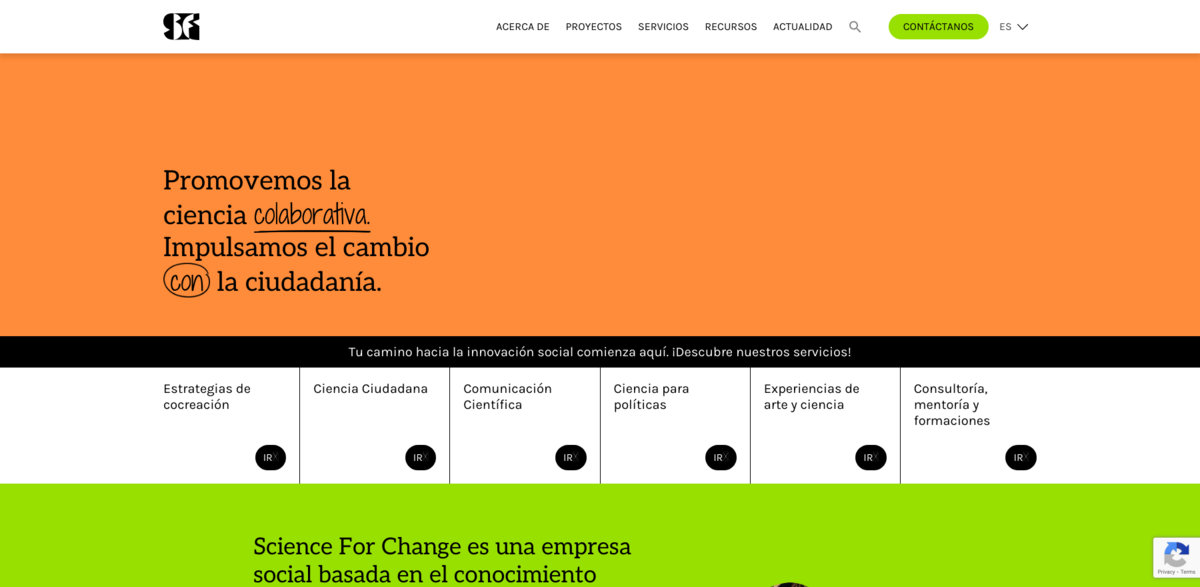What is Science for Change?
Science for Change (SFC) is a social enterprise rooted in knowledge, dedicated to promoting collaborative science. Born in 2019 from the European project D-NOSES, which focused on monitoring odor pollution through citizen science, SFC has quickly established itself as a European expert in citizen science and collaborative research. The team is interdisciplinary, combining diverse expertise to drive change with citizenship. Simply put, SFC is where your path to social innovation begins. Discover their services and see how they make science a shared journey.
Main Benefits and Key Facts
Science for Change isn’t just talk — it delivers real impact. Here are some key figures and facts that highlight its reach and influence:
- Experience in over 15 European projects aimed at generating a positive impact on society.
- Collaboration with more than 100 institutions across 30+ countries.
- Recognition at regional, national, and European levels.
- Active participation in various entities committed to social innovation.
- Development of an inclusive and highly replicable methodology applicable to any field of knowledge.
Mission and Vision
The mission of Science for Change is clear: facilitate collaborative research among different agents to co-design solutions addressing challenges that matter to citizens. It’s all about contributing to evidence-based public policies. Their vision? A paradigm shift that democratizes science — real, active, and inclusive participation of society in knowledge generation. It’s science, but not as you know it. It’s science for everyone, by everyone.
Core Values Driving the Work
At the heart of SFC are values that shape every project and partnership:
- Collaborative knowledge is the ultimate goal.
- Creativity fuels every step forward.
- Collaboration forms the foundation of all initiatives.
- Sustainability is embedded in their DNA.
- Aiming for a positive impact on society is non-negotiable.
- Inclusion is the key to truly democratizing knowledge.
Approach and Methodology
Science for Change tackles social, environmental, and health challenges through citizen science, participatory strategies, and co-creation. Their own methodology? It’s inclusive, adaptable, and highly replicable — designed to involve different agents in co-creating solutions and making decisions together. The process starts with a challenge, problem, need, or opportunity. Then, they investigate, review the state of the art, define the what, why, who, when, where, and how, take collaborative action, evaluate and document everything, and finally focus on implementing the results. Obstacles become opportunities — their methodology is the guiding thread throughout.
Impact on Society and Beyond
- Supports evidence-informed public policies.
- Promotes democratization of science through active citizen participation.
- Drives social innovation by connecting diverse stakeholders.
- Contributes to solving pressing social, environmental, and health challenges.
- Fosters sustainability and inclusion in all projects.
Linked Sustainable Development Goals (SDGs)
- SDG 3: Good Health and Well-being
- SDG 10: Reduced Inequalities
- SDG 11: Sustainable Cities and Communities
- SDG 12: Responsible Consumption and Production
- SDG 13: Climate Action
- SDG 16: Peace, Justice, and Strong Institutions
- SDG 17: Partnerships for the Goals
The Team Behind Science for Change
The SFC team is a vibrant mix of changers who listen, explore, connect, and transform. Their interdisciplinary approach means they bring different perspectives to the table, co-creating a positive impact on society. They’re not just scientists or researchers — they’re collaborators, innovators, and social changemakers. Together, they’re driving a movement where science meets society in the most inclusive and impactful way possible.


















